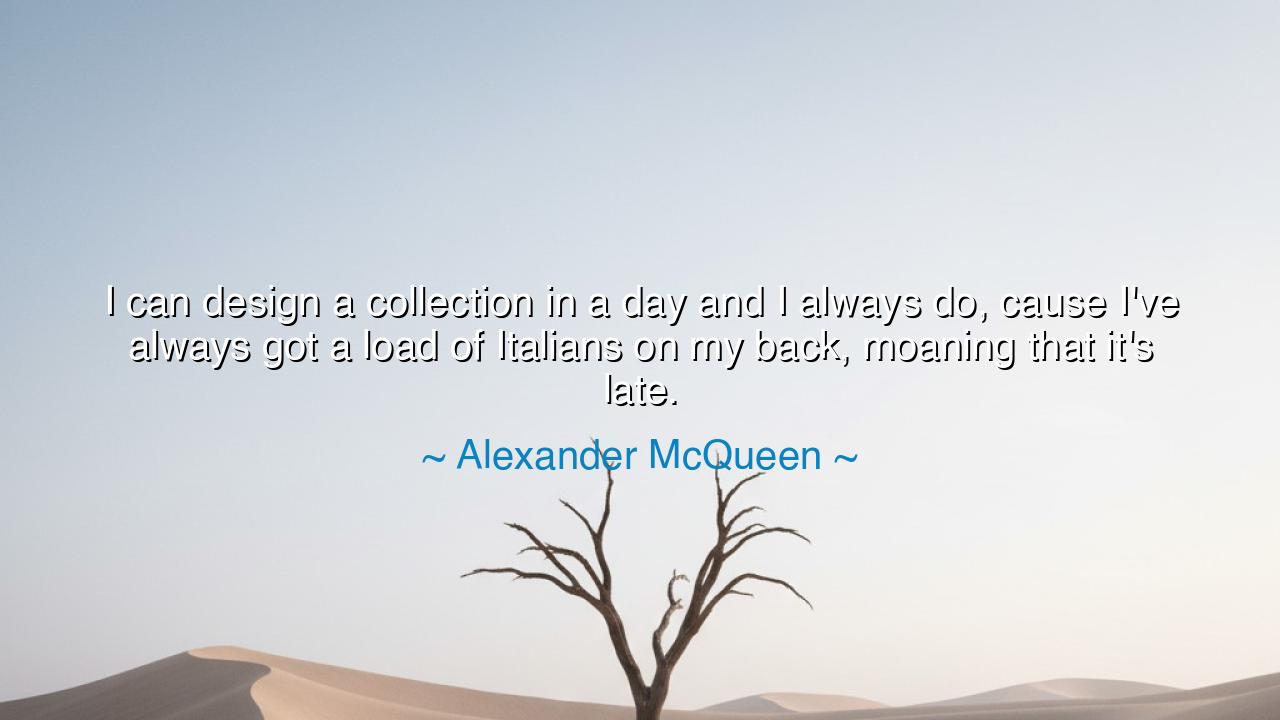
I can design a collection in a day and I always do, cause I've
I can design a collection in a day and I always do, cause I've always got a load of Italians on my back, moaning that it's late.






“I can design a collection in a day and I always do, cause I’ve always got a load of Italians on my back, moaning that it’s late.” — Alexander McQueen
Thus spoke Alexander McQueen, the tempest of British fashion — a man of genius and rebellion, whose artistry burned with the fire of the gods. In these words, spoken with wit and exhaustion, McQueen reveals not only the intensity of his craft, but the relentless rhythm of creation that defined his life. On the surface, his quote may sound flippant, even humorous — a glimpse into the chaos of the fashion world. Yet beneath the jest lies a truth as ancient as art itself: creation is born under pressure, and genius often walks hand in hand with struggle.
When McQueen declares, “I can design a collection in a day,” he is not boasting, but confessing the ferocity of his gift. For in the world of couture, time is a cruel master. Deadlines chase dreams, and perfection must be forged in haste. The “Italians on his back” — the manufacturers, collaborators, and financiers — symbolize the demands of commerce pressing against the wings of artistry. And yet, McQueen does not crumble beneath their weight. He turns pressure into power, urgency into inspiration. Like the blacksmith shaping molten steel, he creates through fire — his mind moving faster than time itself.
The origin of his words is rooted in his own life’s rhythm — one marked by both brilliance and burden. Born into a working-class family in London’s East End, Lee Alexander McQueen rose from tailoring apprenticeships to the catwalks of Paris. His designs shocked, provoked, and mesmerized. He stitched not merely fabric, but emotion — rage, sorrow, beauty, and rebellion — into every seam. Yet behind the spectacle was a man at war with deadlines, expectations, and his own perfectionism. This quote, spoken with weary humor, captures that tension: the clash between art’s purity and the world’s impatience.
In this, McQueen stands among the great creators of every age. Consider Michelangelo, who toiled for years beneath the ceiling of the Sistine Chapel, his patrons forever demanding progress while he demanded perfection. He, too, knew the torment of genius constrained by time — of vision pushed by the hand of urgency. And yet, it is this very pressure that crystallizes the impossible into existence. The sculptor’s hammer, the poet’s quill, the designer’s needle — all must work against the ticking of the clock. For the truth is this: creation thrives not in comfort, but in constraint.
McQueen’s words also speak to the paradox of genius: that beauty can be born from chaos. In one day, he could summon an entire world — silhouettes, textures, movements, and moods — not because he worked carelessly, but because his soul was always designing, even in silence. The mind of an artist never rests. It collects fragments — the shape of a bird’s wing, the sadness of an ancient statue, the violence of a storm — and when the moment comes, these fragments fuse into form. The “day” McQueen speaks of is not twenty-four hours; it is the culmination of a lifetime of vision.
Yet there is also weariness in his words. The laughter hides the toll. For the same fire that drives creation can also consume the creator. McQueen lived in a world that demanded constant reinvention — a world that applauds beauty but rarely cares for the soul that makes it. His remark reveals the cost of living in pursuit of perfection, the exhaustion of being extraordinary in a system that values output over spirit. The “Italians moaning that it’s late” are but symbols of a world that rushes art, forgetting that beauty, like the heart, needs time to breathe.
So, O dreamers and makers of this age, learn from this tale. Pressure is inevitable, but passion must remain sacred. Let the world’s demands push you, but not poison you. Create swiftly when you must, but never forget that true art comes from depth, not speed. McQueen’s legacy reminds us that greatness often blooms amid constraint — but the artist must guard his fire, lest it consume him.
For as Alexander McQueen proved, the artist’s task is not only to design garments, but to design emotion, to give shape to the unspeakable. Even when the world moans and time presses, the true creator transforms chaos into beauty. And though he may labor in a single day, what he leaves behind endures for eternity — proof that from pressure comes brilliance, and from brilliance, immortality.






AAdministratorAdministrator
Welcome, honored guests. Please leave a comment, we will respond soon